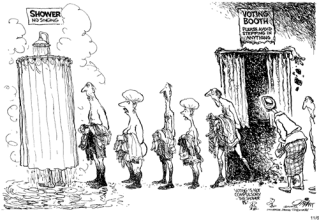Newsflash: Democracy Not Perfect - Blame My Ancestors
Haven't posted in a while, but I figure what better time to get back on the horse than today because....It’s voting day, and all around the country people are going to the polls to exercise their
I found out today that the very first Republic in the world was the ancient state of Vaishali, named after the Great King Vishal, in what is today Bihar state in India. In the words of wikipedia, “even before the advent of Buddhism and Jainism, Vaishali was a vibrant republican state; in fact, it was the first republic in the world, similar to those later found in Ancient Greece.”
A lot has changed since my namesake first established the idea of popular rule in the sixth century B.C. The idea of the Republic has on several occasions flourished, died, been resuscitated, exported, imported, imposed, exposed, and it has undergone a seemingly infinite number of transformations over the centuries. At least one famous historian has suggested in more recent times that it is part of the final and ultimate form of human government—the end of history.
Whenever these types of governments come to an occasional climax in the form of large-scale elections like the sort being held today, they become the subject of innumerous praise and optimistic paeans (see here, for example), one after another, glorifying the ability of such systems to fix what is wrong in the world and remove all of the ills that afflict society from the top-down. After the elections, those disappointed with the results can only go so far with their criticism, because after all, the results are ‘the will of the people’ and by extension they reflect the people’s best interests.
In the run up to the election, however, a very small group of persons in power and their financial supporters spend large amounts of money into scaring the population into better understanding what their will should be. This is done because those few understand that the phrase, ‘the will of the people,’ is so mutable and moldable that it rings hollow and is often up for sale to the highest bidders or the best manipulators.
 A recent New York Times op-ed recaps a psychological study in which people were asked to evaluate two candidates, the first of whom is described as having very average characteristics, and the second of whom has some very good and other very bad characteristics. When people were asked to choose which candidate they would accept, they overwhelmingly chose the second candidate, keeping in mind his very good features. However, when people were instead asked which candidate they would reject, they also overwhelmingly chose the second candidate, perhaps bringing his very bad features to mind. So, then, which is the will of the people? The first or the second candidate? The answer doesn’t depend on the candidate, but on how the question is asked.
A recent New York Times op-ed recaps a psychological study in which people were asked to evaluate two candidates, the first of whom is described as having very average characteristics, and the second of whom has some very good and other very bad characteristics. When people were asked to choose which candidate they would accept, they overwhelmingly chose the second candidate, keeping in mind his very good features. However, when people were instead asked which candidate they would reject, they also overwhelmingly chose the second candidate, perhaps bringing his very bad features to mind. So, then, which is the will of the people? The first or the second candidate? The answer doesn’t depend on the candidate, but on how the question is asked.Politics is all about framing questions—Do you want to protect the institution of marriage? Do you support the Patriot Act?—and not at all about the issues. The side that scares people the most wins—or sometimes loses if the people get offended. Somewhere in there, often lost amidst the sound and the fury, are the best interests of the people. And this manipulation is even praised by many, such as those who believe that the ridiculously negative personal attack ads during this election cycle—at the expense of informational ads about important issues—are a "gloriously refreshing" affirmation of the vitality of American democracy. In fact, these attack ads just change the pyschological framing of the election from "who do you want to elect?" into "who do you not want to elect?" The answer to both of these questions, if the study is believed, can paradoxically be the same.
The American democracy / republic is not perfect. It sometimes seems like more of a game than a system designed to help people and improve government. The results of elections may less reflect the free will of the people than they do the depth of politicians’ pockets and the shrewdness of their campaigns. It is perhaps ironically and ominously symbolic that the world's first republic, my namesake’s kingdom of Vaishali, is now located in the modern-day state of Bihar, the most politically corrupt and poverty-ridden state in India. Nevertheless, one definition of a Republic is ‘a non-monarchy’, and I can say with the certainty of someone who has lived in Saudi Arabia that, in fact, a democratic republic is better than a monarchy.
Therefore, here’s to us not being a monarchy, the mid-term elections, a continued critical analysis of our democracy, and a psychological rejection of the Republican-controlled congress (if not a psychological acceptance of a Democrat-Controlled congress).


1 Comments:
Nice post, kid. Erudite, reasoned, and insightful. It has made me realize anew why I hate politics, and also why I'm addicted to it - (I have a talent for manipulating the public's perception of their own will. (Suckers.)) A parting question, if I may: Why do you hate freedom?
10:18 PM
Post a Comment
<< Home